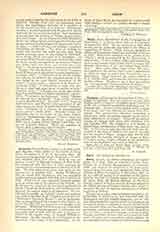

Garland, JOHN, an English poet and grammarian, who lived in the middle of the thirteenth century. He tells us he was born in England and studied at Oxford with John of London, one of Roger Bacon‘s masters. He goes on to add that he was “fostered” in France and cherished that land above the land of his birth. The greater portion of his life was spent there. At one time he studied at the University of Paris, and then taught grammar and belles-lettres at Toulouse, and later at Paris. He went to Toulouse at the time of the close of the Albigensian war. Hence it was about 1229 that he composed the “Epithalamium Beata Virginis Maria”, dedicated to Cardinal Romano Bonaventura, Cardinal-Deacon of Sant’ Angelo, who, as legate, was trying to win back the people of Languedoc to the orthodox Faith. His “De triumphis Ecclesiae” belongs to this period also. It is an epic poem in distichs, celebrating the victories of the crusades, the crushing of heresy, and the glories of the Faith. In 1234 he was back in Paris and wrote his “Accentuarium”, a poem in 1426 hexameter verses on the laws of accent. A little later, at Paris also, he composed his “Carmen de Ecclesia”, a poem on the liturgy, dedicated to Fulk, Bishop of London (1244-59). In it the poet laments the recent death of his fellow-countryman, Alexander of Hales, who died on August 21, 1245. After the manner of the schoolmasters of his day, he wrote a glossary of this poem. For his own use as a tutor he wrote a “Distigium” or “Cornutus” in forty-two hexameter verses, grouped in pairs, to assist in remembering unusual Latin words or latinized Greek words; a”Dictionarius cum commento”, or glossary; a compendium of grammar, in verse; an “Aequivoca”, or list of homonyms, also in verse; a treatise on rhetoric with the odd title “Moral Examples” (Exempla honesty vitae); a “Commentarius curiatium”, intended to explain to the children of nobles the meaning of such Latin words as might interest them; a “Poetria”, or collection of examples in every style of versification.
In the “Exempla” he tells us he got his name from the Rue Garlande (now the Rue Galande), a main thoroughfare in the neighborhood of the university where he taught. It was for his pupils in Paris that he penned the “Miracula Beatae Mariae Virginis”, wherein he tells us that he worked at it in the library of Ste-Genevieve, which goes to prove that it was open to the public. It is the earliest reference to this library. Other works are attributed to John Garland, some of them erroneously, as the various poems entitled “Facetus”; “De contemptu mundi”; “Flore tus”; “Cornutus novus”; a treatise on chemistry; a treatise on interest. Many of the above have never been edited. John Garland’s verses are very faulty, being merely bad prose versified. The style is designedly obscure and absurdly pedantic. The sarcasms of Erasmus with reference to the pedagogical methods of medieval teachers are often supported by quotations from Garland‘s writings. For men of the Renaissance, he was held up as a type the scholastic turning to literature.
PAUL LEJAY

